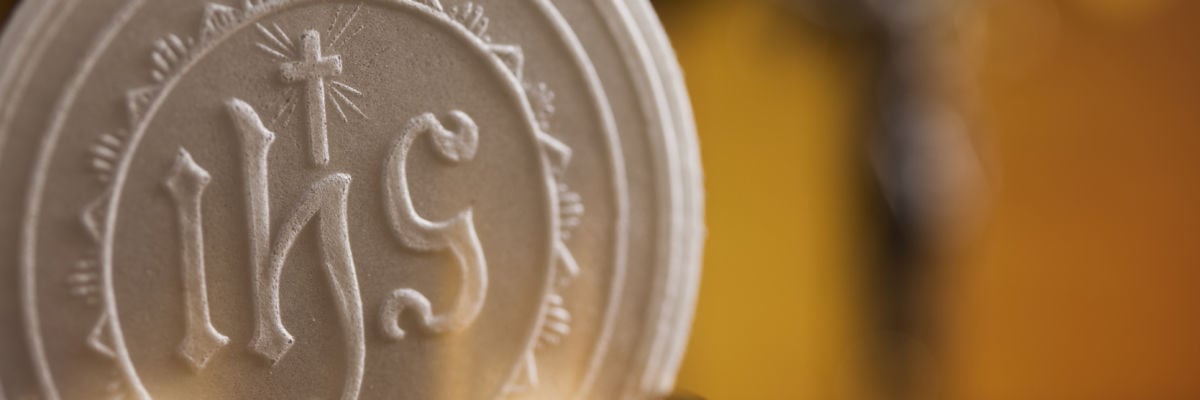
Catholics argue that when Jesus said at the Last Supper, “This is my body . . . This is my blood” (Matt. 26:26, 28), he literally meant for bread to become his body and wine his blood.
But a Protestant might object: “Wait a minute. If we take the bread and wine to be really Jesus’ body and blood because he says, ‘This is my body . . . This is my blood,’ then we’re gonna have to say Paul meant the rock that followed the Israelites in the wilderness to be really Jesus, since he says, ‘the Rock was Christ’ (1 Cor. 10:4). But most Christians don’t believe the rock really was Jesus, like Catholics believe the consecrated host really is Jesus’ body. Therefore, we shouldn’t take Jesus to mean that the bread and wine really became his body and blood because he says, ‘This is my body . . . This is my blood.’”
What should we make of this objection?
First, the appeal to 1 Corinthians 10:4 doesn’t show that Jesus’ use of “is” must be taken figuratively. It only shows that the verb “is” can be taken figuratively. As such, this argument only gets as far as saying a figurative interpretation, like in 1 Corinthians 10:4, is possible.
But this is a moot point, because Catholics could agree that Jesus’ words “This is my body . . . This is my blood” taken by themselves can be interpreted literally or figuratively. There’s nothing in the words themselves that determines one interpretation over the other. So, Catholics need have no qualms with saying these words could be taken figuratively when they’re considered in isolation from other evidence.
Second, the objection demands that a Catholic should interpret Jesus’ use of the verb “to be” at the Last Supper like it’s used in 1 Corinthians 10:4—figuratively, the reason being that it’s supposedly obvious that bread and wine can’t be Jesus’ body and blood. However, such a demand would be common only on the supposition that Jesus is not performing a miracle.
For example, I might hold up a picture of my father and say, “This is my father,” and you know that the picture is not literally my father but a figure of him. But—and here’s the key—your conclusion would be based on the assumption, and a true one at that, that I’m not performing the miracle of making my father substantially present under the form of ink and paper.
Similarly, to interpret Jesus’ use of “is” at the Last Supper figuratively would be natural if we already knew he’s not performing a miracle. But if there is evidence that what Jesus is doing at the Last Supper is miraculous, then a literal interpretation would be a viable option, and even a more probable one.
And there is an abundance of such evidence. Due to the limited space here, however, we’re only going to consider some of the evidence.
When Jesus first made the promise to give his flesh to eat in John 6:51-52, he did so against the backdrop of the manna of old: “Your fathers ate the manna in the wilderness, and they died. This is the bread which comes down from heaven, that a man may eat of it and not die . . . the bread which I shall give for the life of the world is my flesh.”
This bread that God gave in the wilderness was not ordinary bread. It was miraculous bread:
- It was bread that rained from heaven (Exod. 16:4).
- It appeared every day with the coming of the “dew” (Exod. 16:13)
- It never lasted more than a day, except on the Sabbath. When the Israelites didn’t obey the instruction to leave none until the next day, it “bred worms and became foul” (Exod. 16:19-20).
- It didn’t appear on the Sabbath. And the amount they gathered on the sixth day did not breed worms and become foul (Exod. 16:22-26).
- It appeared every day for forty years, and only stopped upon the Israelites entering the promised land (Exod. 16:35; Joshua 5:10-12).
- A jar with an omer’s worth was kept in the Israelite’s sanctuary “throughout the generations” (Exod. 16:31-34)
As bible scholar Brant Pitre argues in his book Jesus and the Jewish Roots of the Eucharist, to say the Eucharist at the Last Supper, the New Manna, is merely a symbol, we’d have to conclude that the Old Manna in the wilderness was superior to the New, since miraculous bread is clearly greater than ordinary bread. But that’s a no-go in biblical theology. The New Testament fulfillment is always greater than the Old Testament type.
Therefore, the Eucharist at the Last Supper couldn’t have been ordinary bread, which is what it would have to have been on the view that Jesus was speaking metaphorically. Rather, there’s something supernatural to it. And that supernatural quality allows for us to interpret literally the words of institution (“This is my body . . . this is my blood”), meaning that the bread and wine became his body and blood.
That the Eucharist is supernatural is further confirmed by Jesus’ teaching that faith is required to accept his command to eat his flesh and drink his blood. Jesus prefaces his revelation that his flesh is the bread of life by saying, “No one can come to me unless the Father who sent me draws him” (v.44). Then, after giving his discourse about eating his flesh and drinking his blood, he says, “There are some of you that do not believe . . . This is why I told you that no one can come to me unless it is granted him by my Father” (v.64-65). If Jesus begins and concludes his remarks about eating his flesh and drinking his blood with faith, a gift that only the Father can give, then Jesus is revealing that faith is required to accept his teaching.
There’s something else that Jesus says which reveals the requirement of faith: “It is the spirit that gives life, the flesh is of no avail; the words that I have spoken to you are spirit and life” (v.63).
“The flesh” is a New Testament phrase that is often used to describe human nature apart from God’s grace (Mark 14:38, Rom. 8:1-14, 1 Cor. 2:14-3:1). What Jesus means is that without God’s grace, and in particular the grace of faith, acceptance of Jesus’ command to eat his flesh and drink his blood is impossible. If his disciples are to believe his teaching, they must avail themselves of that grace.
Jesus’ statement about his words being “spirit and life” mean that his teaching is of the Spirit and therefore can be accepted only by the power of the Spirit. This makes sense of why Jesus’ command to eat his flesh and drink his blood is bookended by his teachings about faith (v.44, 65).
Since what Jesus says in John 6 is a promise of what will be fulfilled at the Last Supper, and he teaches that faith is required to accept what he says, it follows that faith would also be required when confronted with the words at the Last Supper: “This is my body . . . This is my blood.”
Now, what need would there be for faith if the bread and wine at the Last Supper were intended by Christ to merely represent or signify his body and blood? Faith would not be needed to believe that bread and wine serve as a symbol of Jesus’ body and blood. But faith would be needed if the bread and wine became his body and blood, which, of course, would be miraculous.
Since Jesus teaches that faith is required to accept what he says about the bread and wine being his body and blood, it follows that there is a supernatural dimension to the Eucharist. And if the Eucharist is supernatural, then we have good reason to not automatically take Jesus’ words to be metaphorical. The supernatural nature of the Eucharist makes the literal interpretation a viable option.
Given the supernatural nature of the Eucharist, there’s no need for a Catholic to give up his literal interpretation of Jesus’ use of the verb “is” in favor of a figurative interpretation as we see in 1 Corinthians 10:4. The two cases are disanalogous, and thus cannot be read in light of each other. Catholics, therefore, don’t have to settle for the ridiculous claim that Jesus became a rock in the wilderness in order to keep our literal interpretation of the words of institution: “This is my body . . . this is my blood.”



